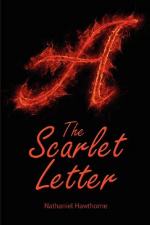By this time Pearl had reached the margin of the brook, and stood on the further side, gazing silently at Hester and the clergyman, who still sat together on the mossy tree-trunk waiting to receive her. Just where she had paused, the brook chanced to form a pool so smooth and quiet that it reflected a perfect image of her little figure, with all the brilliant picturesqueness of her beauty, in its adornment of flowers and wreathed foliage, but more refined and spiritualized than the reality. This image, so nearly identical with the living Pearl, seemed to communicate somewhat of its own shadowy and intangible quality to the child herself. It was strange, the way in which Pearl stood, looking so steadfastly at them through the dim medium of the forest gloom, herself, meanwhile, all glorified with a ray of sunshine, that was attracted thitherward as by a certain sympathy. In the brook beneath stood another child—another and the same—with likewise its ray of golden light. Hester felt herself, in some indistinct and tantalizing manner, estranged from Pearl, as if the child, in her lonely ramble through the forest, had strayed out of the sphere in which she and her mother dwelt together, and was now vainly seeking to return to it.
There were both truth and error in the impression; the child and mother were estranged, but through Hester’s fault, not Pearl’s. Since the latter rambled from her side, another inmate had been admitted within the circle of the mother’s feelings, and so modified the aspect of them all, that Pearl, the returning wanderer, could not find her wonted place, and hardly knew where she was.
“I have a strange fancy,” observed the sensitive minister, “that this brook is the boundary between two worlds, and that thou canst never meet thy Pearl again. Or is she an elfish spirit, who, as the legends of our childhood taught us, is forbidden to cross a running stream? Pray hasten her, for this delay has already imparted a tremor to my nerves.”
“Come, dearest child!” said Hester encouragingly, and stretching out both her arms. “How slow thou art! When hast thou been so sluggish before now? Here is a friend of mine, who must be thy friend also. Thou wilt have twice as much love henceforward as thy mother alone could give thee! Leap across the brook and come to us. Thou canst leap like a young deer!”
Pearl, without responding in any manner to these honey-sweet expressions, remained on the other side of the brook. Now she fixed her bright wild eyes on her mother, now on the minister, and now included them both in the same glance, as if to detect and explain to herself the relation which they bore to one another. For some unaccountable reason, as Arthur Dimmesdale felt the child’s eyes upon himself, his hand—with that gesture so habitual as to have become involuntary—stole over his heart. At length, assuming a singular air of authority, Pearl stretched out her hand, with the small forefinger extended, and pointing evidently towards her mother’s breast. And beneath, in the mirror of the brook, there was the flower-girdled and sunny image of little Pearl, pointing her small forefinger too.




